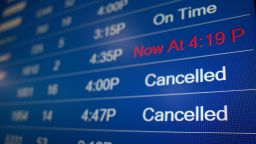More than 7,800 flights across the United States were delayed or canceled Monday after powerful storms ripped through the parts of the country, mainly in the Southeast and the Ohio Valley.
Data from FlightAware showed that on Monday evening, 6,196 flights within, into or out of the US were delayed and another 1,674 were canceled.
United Airlines (UAL)was faring the worst of the American domestic airlines. About 10% of its schedule, or 314 flights, was canceled and another 17%, or 853 flights, was delayed as of 6 pm ET. Delta (DAL) wasn’t far behind, with 6% (216 flights) of its schedule canceled and 24% (845 flights) delayed.
Two commuter airlines also had their schedules disrupted. Republic Airways, which operates short-haul flights for American Airlines, Delta and United, had 30% of its schedule canceled (300 flights) and 23% (233 flights) delayed. Endeavor Air, a Delta-owned carrier, experienced a similar number of delays and cancellations.
The delays and cancellations come after thunderstorms battered parts of Arkansas, Tennessee, Mississippi and the Ohio Valley Sunday evening, according to the National Weather Service’s Storm Prediction Center. More than 700,000 people across the region are without power
Meanwhile, more than 50 million people from Arizona to Louisiana faced “oppressive” heat on Sunday in a significant heat wave that is forecast to spread and continue through the beginning of the July 4 holiday week. Experts say it could potentially break several high temperature records across the region.
The four US airports most affected Monday morning are all major hubs for either United or Delta: New Jersey’s Newark Liberty, both of New York’s airports (LaGuardia and John F. Kennedy) as well as Atlanta’s Hartsfield-Jackson and Boston’s Logan.
Monday’s forecast also looks tough for travelers with 90 million people under threat of severe storms. A Level 3 out of 5 “enhanced risk” is highlighted for the mid-Atlantic and Northeast, where multiple rounds of thunderstorms are possible later in the day. Philadelphia, Baltimore, Washington, DC, and Raleigh, North Carolina, are included in the enhanced risk area.


























